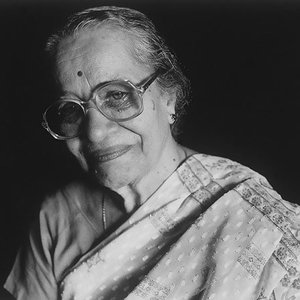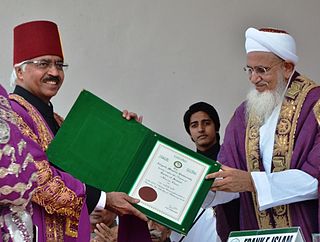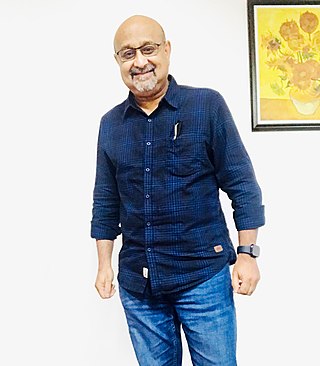Vulimiri Ramalingaswami was an Indian medical scientist, pathologist and medical writer. His pioneering research on nutrition got him elected to the National Academy of Sciences, Russian Academy of Medical Sciences and the Royal Society of London.
M. Krishnan Nair was an Indian oncologist. He was the founding director of the Regional Cancer Centre, Thiruvananthapuram, a director of the S.U.T. Institute of Oncology, and Trivandrum Cancer Center(TCC), part of SUT Royal Hospital in Thiruvananthapuram (Trivandrum) and a professor at the Amrita Institute of Medical Sciences & Research in Kochi. The Government of India awarded him the fourth highest civilian award of the Padma Shri, in 2001 for his contributions in the cancer care field.

Kamal Jayasing Ranadive was an Indian biomedical researcher known for her research on the links between cancers and viruses. She was a founding member of the Indian Women Scientists' Association (IWSA).
Indira Nath was an Indian immunologist. Her major contribution in medical science deals with mechanisms underlying immune unresponsiveness in man, reactions and nerve damage in leprosy and a search for markers for viability of the Leprosy bacillus. Prof. Nath's fields of specialisations are Immunology, Pathology, Medical biotechnology and communicable diseases.
Dr. Kodaganur S. Gopinath, MS, FAMS, FRCS (Edin) is an Indian surgical oncologist, known for his pioneering work on oncological research. He is a recipient of many awards including Dr. B. C. Roy Award, considered to be the premier medical honour in the country. The President of India recognised his services to the field of oncology, by awarding him the fourth highest civilian award, Padma Shri, in 2010.
Saroj Chooramani Gopal, is an Indian medical doctor, medical educationist and considered as the first woman M.ch paediatric surgeon from All India Institute of Medical Sciences, New Delhi in the country. She is currently the President, National Academy of Medical Sciences (India). She was honoured by the Government of India, in 2013, by bestowing on her the Padma Shri, the fourth highest civilian award, for her contributions to the fields of medicine and medical education.
Dorairajan Balasubramanian, popularly known as Professor Balu, is an Indian biophysical chemist and ocular biochemist. He is a former President of Indian Academy of Sciences and a director of research at the Prof. Brien Holden Eye Research Centre of L. V. Prasad Eye Institute, Hyderabad. A recipient of the National Order of Merit (France), Balasubramanian was honored by the Government of India, in 2002, with the fourth highest Indian civilian award of Padma Shri

Ashok Seth is an Indian interventional cardiologist, credited with the performance of over 50,000 angiograms and 20,000 angioplasties, which has been included in the Limca Book of Records, a reference book for achievements and records from an Indian perspective. He is a Fellow of the Royal Colleges of Physicians of London, Edinburgh and Ireland and serves as the chief cardiologist, holding the chairs of the department of cardiovascular sciences and cardiology council at the Fortis Healthcare. Seth, a recipient of the Order of Isabella the Catholic, was honored by the Government of India with the fourth highest Indian civilian award of Padma Shri, in 2003, followed by Padma Bhushan, the third highest Indian civilian award, in 2015.
Sibte Hasan Zaidi was an Indian pathologist and toxicologist. After his training in pathology at the Hammersmith Hospital in London, United Kingdom, he returned to India to continue experimental toxicology research initially at the Central Drug Research Institute, and then as Founding Director at Industrial Toxicology Research Center (ITRC) in Lucknow (1965-1978). During his later years, he served on national and international committees to increase awareness and set policy to prevent the harmful effects of industrial toxins in people.
Madhav Gajanan Deo is an Indian oncologist, pathologist and educationist, known for his contributions to the field of Molecular medicine. He is the founder president of the Indian Association of Cancer Research and one of the founders of the Moving Academy of Medicine and Biomedicine. He is a recipient of the Om Prakash Bhasin Award. The Government of India awarded him the fourth highest civilian award of Padma Shri in 1990.
Govind Narain Malviya is an Indian physician and leprologist, known for his efforts in the treatment and rehabilitation of Leprosy patients in India. He is the deputy director of the Central JALMA Institute for Leprosy, Agra. Malviya has delivered many award lectures and is the author of several medical papers; ResearchGate, an online repository of scientific papers, have listed 109 of his articles. The Government of India awarded him the fourth highest civilian award of Padma Shri in 1991. Nine years later, the Medical Council of India honoured him with Dr. B. C. Roy Award, the highest Indian award in the medical sector.
Asis Datta is an Indian biochemist, molecular biologist and genetic engineer, known for his research on genetically modified foods and food nutritional security. He was the founding Director of the National Institute of Plant Genome Research and is credited with the discovery of genes that assist in extended preservation of fruits and vegetables. He is a recipient of the Shanti Swarup Bhatnagar Award, the highest Indian award and in the Science category, and was awarded the fourth highest civilian award of the Padma Shri, by the Government of India, in 1999. In 2008, he was included again in the Republic Day Honours list for the third highest civilian honour of the Padma Bhushan.

Anoop Misra is an Indian endocrinologist and a former honorary physician to the Prime Minister of India. He is the chairman of Fortis Centre for Diabetes, Obesity and Cholesterol (C-DOC) and heads, National Diabetes Obesity and Cholesterol Foundation (NDOC). A former Fellow of the World Health Organization at the Royal Free Hospital, UK, Misra is a recipient of the Dr. B. C. Roy Award, the highest Indian award in the medical category. The Government of India awarded him the fourth highest civilian honour of the Padma Shri, in 2007, for his contributions to Indian medicine.
Prem Nath Wahi (1908–1991) was an Indian pathologist, writer, medical academic and the director general of the Indian Council of Medical Research. He was a fellow of the Royal College of Physicians of London, a founder fellow of the National Academy of Medical Sciences and a recipient of Dr. B. C. Roy Award and the Padma Bhushan.
Raman Viswanathan (1899–1982) was an Indian chest physician, medical mycologist and pulmonologist, considered by many as the father of Chest Medicine in India. He was the founder director of Vallabhbhai Patel Chest Institute, a postgraduate medical institute based in Delhi. An elected fellow of the American College of Chest Physicians, Royal College of Physicians of London, Indian National Science Academy and the Academy of Medical Sciences, United Kingdom, he was a recipient of several honors including the Forlanini Medal by Italian Tuberculosis Association and the Eugeno Morelli Prize of the National Academy of Sciences, Italy. The Government of India awarded him the third highest civilian honour of the Padma Bhushan, in 1974, for his contributions to medicine.
Shiv Kumar Sarin is an Indian gastroenterologist, hepatologist, translational scientist, researcher and teacher. He set up the Institute of Liver and Biliary Sciences. He is a recipient of the Shanti Swarup Bhatnagar Prize and the Padma Bhushan. He served as Chairman of the Board of Governors of Medical Council of India. He was the president of the Asian Pacific Association for the Study of the Liver and founder of Asian Pacific School of Hepatology.
Umesh Chandra Chaturvedi was an Indian virologist, immunologist, medical microbiologist, CSIR Emeritus Scientist and a former chairman of the Bharat Immunologicals and Biologicals Corporation. The founder head of the department of microbiology at King George's Medical University, he is known for his studies on Dengue virus infection. Chaturvedi is an elected fellow of all the three major Indian science academies viz. Indian Academy of Sciences, National Academy of Sciences, India and the Indian National Science Academy as well as the Royal College of Pathologists and National Academy of Medical Sciences. The Council of Scientific and Industrial Research, the apex agency of the Government of India for scientific research, awarded him the Shanti Swarup Bhatnagar Prize for Science and Technology, one of the highest Indian science awards for his contributions to Medical Sciences in 1981.
Narinder Kumar Mehra is an Indian immunologist, head of the department of transplant immunology and immunogenetics of the SRL Limited, Gurgaon. He is a former dean of research and holds the ICMR Dr. C.G. Pandit National Chair at AIIMS. An elected fellow of the International Medical Sciences Academy, The World Academy of Sciences, Indian National Science Academy and National Academy of Sciences, India, Mehra is known for his research on histocompatibility and immunogenetics. The Council of Scientific and Industrial Research, the apex agency of the Government of India for scientific research, awarded him the Shanti Swarup Bhatnagar Prize for Science and Technology, one of the highest Indian science awards for his contributions to Medical Sciences in 1992. He received the Chevalier of the National Order of Merit from François Mitterrand in 2003.

Madhavan Radhakrishna Pillai is an Indian cancer biologist and the former director of the Rajiv Gandhi Centre for Biotechnology. Known for his studies on papilloma viruses, Pillai is an elected fellow of the Indian Academy of Sciences, National Academy of Sciences, India, Royal College of Pathologists and the National Academy of Medical Sciences. The Department of Biotechnology of the Government of India awarded him the National Bioscience Award for Career Development, one of the highest Indian science awards, for his contributions to biosciences in 2002.



